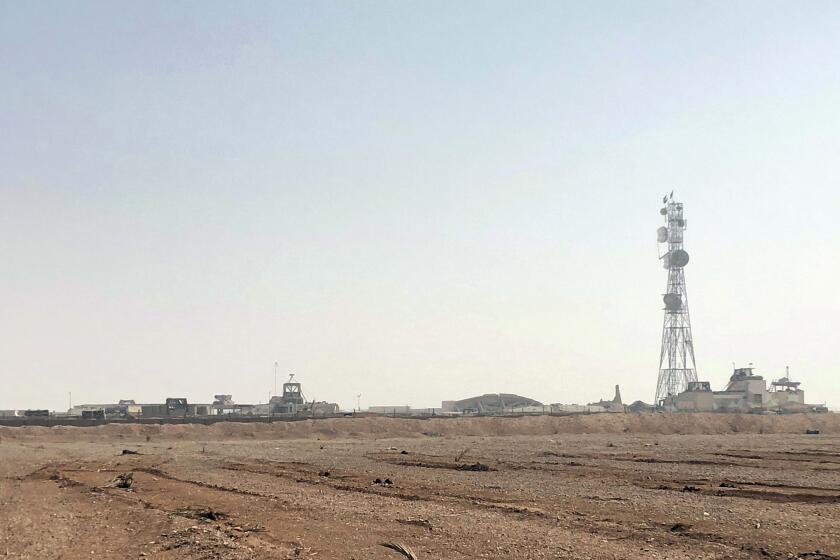U.S. launches airstrike on site in Syria in response to attacks by Iranian-backed militias

- Share via
WASHINGTON — The U.S. launched an airstrike on a facility in eastern Syria used by Iranian-backed militias, in retaliation for what has been a growing number of attacks on bases housing U.S. troops in the region for the last several weeks, the Pentagon said.
Wednesday’s strike by two U.S. F-15 fighter jets was on a weapons storage facility linked to Iran’s Islamic Revolutionary Guard Corps.
“The President has no higher priority than the safety of U.S. personnel, and he directed today’s action to make clear that the United States will defend itself, its personnel, and its interests,” Defense Secretary Lloyd J. Austin III said in a statement.
This is the second time in less than two weeks that the U.S. has bombed facilities used by the militant groups, many operating under the umbrella of the Islamic Resistance in Iraq, which U.S. officials say have carried out at least 40 such attacks since Oct. 17.
U.S. fighter jets launched airstrikes early Friday on two locations in eastern Syria linked to Iran’s Revolutionary Guard Corps, the Pentagon says.
That was the day a powerful explosion rocked a hospital in the Gaza Strip, killing many civilians and triggering protests in a number of Muslim nations. Israel denied responsibility for the Ahli Arab Hospital blast, and the U.S. has said its intelligence assessment found that Israel was not to blame.
But the Israeli military has continued a ferocious assault on Hamas, with ground troops now deep inside Gaza City in retaliation for Hamas’ Oct. 7 massacre of more than 1,400 Israelis. In Gaza, the Hamas-run Health Ministry says Israel has killed more than 10,000 Palestinians, two-thirds of them women and children, in weeks of continuous bombardment.
The latest U.S. strike was designed to take out supplies, weapons and ammunition in an effort to erode the abilities of the Iranian-backed militants to attack Americans based in Iraq and Syria. And it reflects the Biden administration’s determination to maintain a delicate balance. The U.S. wants to hit Iranian-backed groups suspected of targeting the U.S. as strongly as possible to deter future aggression, possibly fueled by Israel’s war against Hamas, while also working to avoid further inflaming the region and provoking a wider conflict.
Similar U.S. airstrikes on Oct. 27 also targeted facilities in Syria, and officials at the time said the two sites were affiliated with Iran’s Revolutionary Guard. When asked why those locations in Syria were chosen — since many of the attacks have happened in Iraq — officials said the U.S. went after storage sites for munitions that could be linked to the strikes on U.S. personnel.
The U.S. military says two rockets have struck a base housing American troops in eastern Syria without causing any human or material losses.
The U.S. has often avoided bombing sites in Iraq in order to lessen the chances of killing Iraqis or angering Baghdad’s leaders.
While officials have said the strikes are meant to deter further attacks, they have not had that effect. Rocket and drone attacks have occurred almost daily, although in nearly all cases they have resulted in little damage and few injuries.
According to the Pentagon, a total of 45 U.S. personnel have been injured, and all of those were in attacks on Oct. 17 and 18. Of those, 32 were at Al Tanf garrison in southeastern Syria, with a mix of minor injuries and traumatic brain injuries, and 13 were at Asad Air Base in western Iraq, with four cases of traumatic brain injury and nine of minor injury. One person was injured at Irbil air base in Iraq.
The Pentagon has faced repeated questions about whether deterrence against Iran and its proxies is working because the attacks have only increased.
At the same time, the department has moved a number of air defense systems and other forces into the region to beef up protection for U.S. forces. And on multiple occasions, the systems have intercepted incoming strikes. According to a U.S. official, the number of ships in the Middle East has more than doubled, the number of Patriot air defense missile systems has about tripled, a few more fighter jet squadrons have been added, and hundreds of additional troops have been deployed to the region. The official spoke on condition of anonymity to discuss force numbers not yet made public.
More to Read
Sign up for Essential California
The most important California stories and recommendations in your inbox every morning.
You may occasionally receive promotional content from the Los Angeles Times.











